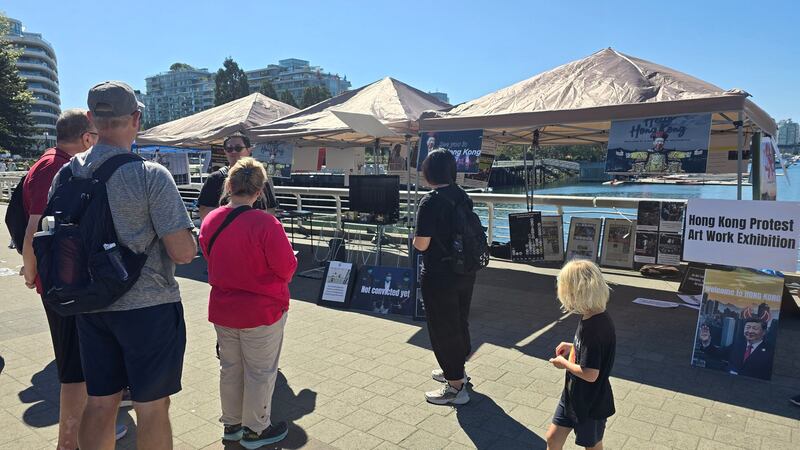Read RFA coverage of this story in Mandarin from London and Canada
Hundreds of Hong Kongers gathered in London over the weekend to mark the fifth anniversary of 2019 attacks by riot police on unarmed train passengers with baton's and tear gas in Prince Edward subway station.
Around 500 people gathered in London's Trafalgar Square on Saturday, raising the colonial-era flag of British Hong Kong and singing the banned protest anthem " Glory to Hong Kong," before lowering the flag to half-mast to mourn those who died during the months-long protests against Hong Kong's vanishing autonomy under Chinese rule.
The protesters then marched to the Hong Kong Economic and Trade Office in London, shouting "Hong Kong is not China!" and "One Hong Kong, one nation!" and handing out information leaflets about the attacks to passers-by.
Police were present at the march, and while the demonstration drew stares from some people around Chinese-owned businesses as the march passed through Chinatown, there was no physical or verbal altercation.
Details of the attacks by riot police at the height of the 2019 protest movement remain shrouded in secrecy. Journalists and activists are having difficulty piecing together a coherent picture of what exactly happened in the station as much of the evidence remains in the hands of the authorities.
While police and government officials have hit out at 'malicious rumors' that someone died, the selective release of stills from surveillance footage from cameras inside the station has done little to assuage public mistrust in the official narrative.
Call for investigation
A woman who gave only the surname Wong for fear of reprisals said she has been living in the U.K. for three years now, and has attended every rally marking the Aug. 31, 2019, attacks.
Wong said the attacks were one of the most iconic events in the entire anti-extradition movement, adding that she "can't accept" that the Hong Kong police charged into a subway station and "indiscriminately attacked" people.
She said the government has yet to fully investigate the incident, and called for the truth about what happened in the subway station to be made public.

The parents of a 6-year-old marcher told RFA Mandarin that they had "mixed feelings" about being allowed to hold peaceful demonstrations in the United Kingdom after moving to the country in June.
They said they felt an obligation to tell people in Britain about how their freedoms were built on the sacrifices of others, and that Hong Kongers had been forced to emigrate to the U.K. by the ongoing political crackdown in their home city.
In Canada, around 40 protesters gathered outside the Chinese Consulate in Calgary, burning photos of Hong Kong Chief Executive John Lee and security chief Chris Tang, who was chief of police at the time of the protest movement, when rights groups hit out at the use of " excessive force" by the authorities.
39 minutes
Public anger against the police treatment of protesters began with the intense tear-gassing of unarmed crowds who had no escape route at the start of the anti-extradition protests.
It gained momentum when officers took 39 minutes to respond to hundreds of emergency calls when unidentified mobsters in white T-shirts attacked passengers and passers-by at Yuen Long MTR on July 21, 2019.
And it took on a much darker turn following the bloody attacks on train passengers, after which the MTR refused to release video footage from trains and platforms despite persistent rumors that at least one person died in the attacks.
Photos of Lee's second-in-command Eric Chan and Secretary for Justice Paul Lam were also burned.
Protest organizer Paul Cheng, who organized the protest, called them Hong Kong's "Gang of Four," and called on the Canadian government to sanction them.
"They helped the Communist Party destroy Hong Kong and kill Hong Kong," Cheng told RFA Mandarin at the protest. "They are the Communist Party's running dogs. The Communist Party is the culprit in the killing of Hong Kong, and they are its accomplices."
Cheng, who emigrated to Canada more than 40 years ago, says he remembers the freedoms once enjoyed by the city's 7 million residents, adding that things are very different now.
First sedition conviction
Last Thursday, a Hong Kong court found two editors of the now-defunct Stand News guilty of conspiring to publish seditious material, marking the first sedition conviction against any journalist since Hong Kong's handover from Britain to China in 1997.
The publication’s former editor-in-chief, Chung Pui-kuen, and former acting editor-in-chief, Patrick Lam, could face a maximum prison term of two years under colonial-era sedition laws.
A former Hong Kong journalist who gave only the nickname Stephen for fear of reprisals said he used to work as a journalist in the city, and was particularly saddened by those convictions.
"All Hong Kong media have the same tone now," he said. "There's no opposing voices, just a unified message."
Meanwhile, Vancouver-based activist Christine described physical and mental "torment" after leaving the city she once called home.
"I can't let it go, to be honest," she said. "It's not easy. But fortunately, there is a group of us with the same aspirations, so we can use that discomfort as motivation."
"So we come out on days that need to be commemorated, which is better than pretending I've forgotten about it," she said.
Translated by Luisetta Mudie. Edited by Malcolm Foster.
